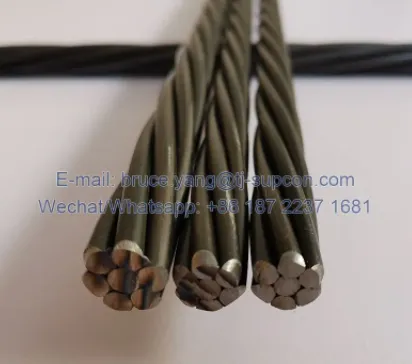Pre-stressed Concrete (PC) strands play a pivotal role in reinforcing concrete structures, providing strength and durability. The production of PC strands involves a meticulous process to ensure the desired mechanical properties and structural performance. Here is an overview of how PC strands are manufactured.
Raw Materials: The primary raw materials used in the production of PC strands are high-quality steel wires. These wires are typically made from low-relaxation steel, a type of alloy designed to minimize elongation over time, ensuring the stability of pre-stressed concrete structures.
Wire Drawing: The process begins with wire drawing, where the high-quality steel wire is drawn through a series of dies to reduce its diameter to the desired size. This wire drawing process imparts a smooth and consistent surface finish to the wire.
Phosphating: To enhance the adhesion between the steel wire and the subsequent coating, the drawn wire undergoes a phosphating process. This involves treating the wire with a phosphate solution, creating a thin layer of phosphate coating on the surface.
Coating: The coated wire is then covered with a layer of corrosion-resistant material, usually zinc. This coating provides protection against environmental factors, preventing rust and corrosion that could compromise the integrity of the PC strands.

Stranding: After the coating process, multiple coated wires are twisted together to form a helical strand. The stranding process involves carefully arranging the wires in a specific pattern, ensuring uniform distribution of stress within the final PC strand.
Pre-stressing: The pre-stressing process is a critical step in the manufacturing of PC strands. The helical strands are subjected to high tensile stress, imparting them with the ability to withstand significant loads once embedded in concrete. This pre-stressing process contributes to the overall strength and durability of the pre-stressed concrete structures.
Cutting and Coiling: Once the pre-stressing process is complete, the long lengths of pre-stressed strands are cut into specific sizes based on project requirements. The cut strands are then coiled for ease of handling, transportation, and storage.
Quality Control: Throughout the manufacturing process, rigorous quality control measures are implemented to ensure that the PC strands meet industry standards and project specifications. This includes regular testing of the steel wire, monitoring coating thickness, and verifying the pre-stressing force applied during production.
Final Inspection: Before the PC strands are released for use, a final inspection is conducted to assess their mechanical properties, dimensions, and overall quality. This ensures that the PC strands are ready to deliver the required strength and performance in concrete structures.
Conclusion: The manufacturing of PC strands involves a comprehensive process, from wire drawing to pre-stressing, to create a robust and reliable material for reinforcing concrete structures. The careful selection of raw materials, precision in manufacturing, and stringent quality control measures contribute to the effectiveness and longevity of PC strands in various construction applications.



Comments
All Comments (0)